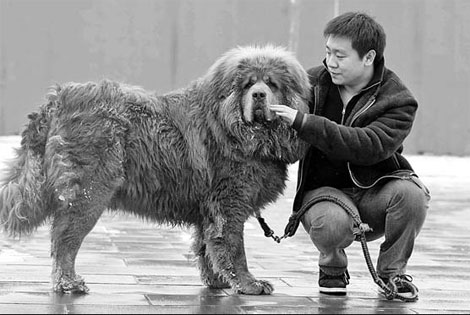
Zhang Pohu, who runs a Tibetan mastiff kennel in Hebei province, with his Tibetan mastiff named Baishi. Wang Jing /
China Daily
Zhang Pohu was puzzled when he used a brush to groom his newly bought Tibetan mastiff from Yushu, Qinghai province, because the brush got stuck in the dog's long hair.
On closer look he found several knots in the hair, caused by artificial extensions engineered using hair from other dogs.
As breeding and buying Tibetan mastiffs has become a lucrative industry, it has also attracted cheats who try to pass off crossbred dogs as pedigree ones.
"Purchasing a Tibetan mastiff is a big gamble. I'd rather go to a reputable breeder. At least it reduces the risk of losing money," says the second-generation rich Zhang, 25, who has raised mastiffs since childhood and opened his Baishi Tibetan mastiff kennel in Hebei province, in 2007.
Instead of visiting the Himalayan plateau where the dogs are originally from, Zhang spends much of his time with mastiff experts who own large breeding farms.
"Because we know each other well, we carefully match our mastiffs and their bloodlines to guarantee their pedigree, so there is little chance of being deceived," Zhang says.
Keeping a Tibetan mastiff has become all the rage among the affluent in China.
In March and April last year, for example, there were more than 10 expos held around the country featuring Tibetan mastiffs.
At the expos, mature mastiffs that are supposed to cost millions were in fact sold for about 100,000 yuan ($15,240) in under-the-table deals.
"One mastiff can fetch millions of yuan. But if you looked at the many stands around the expo halls, you could find mastiff puppies priced at just 800 yuan ($122)," says Hou Gaoliang, marketing manager of Petdog, a nationwide chain store selling pets and pet goods. According to China National Kennel Club (CNKC), there are around 4,000 registered Tibetan mastiff kennels in the nation, 700 of which are large-scale ones, with more than 30 dogs and good facilities.
